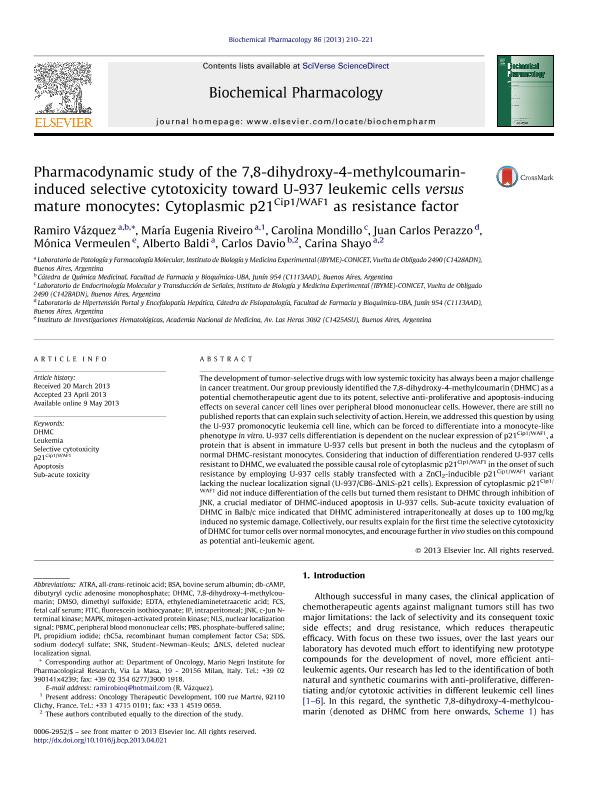Artículo
Pharmacodynamic study of the 7,8-dihydroxy-4-methylcoumarin-induced selective cytotoxicity toward U-937 leukemic cells versus mature monocytes: Cytoplasmic p21(Cip1/WAF1) as resistance factor
Vazquez, Ramiro ; Riveiro, Maria Eugenia
; Riveiro, Maria Eugenia ; Mondillo, Carolina
; Mondillo, Carolina ; Perazzo Rossini, Juan Carlos; Vermeulen, Elba Monica
; Perazzo Rossini, Juan Carlos; Vermeulen, Elba Monica ; Baldi, Alberto
; Baldi, Alberto ; Davio, Carlos Alberto
; Davio, Carlos Alberto ; Shayo, Carina Claudia
; Shayo, Carina Claudia
 ; Riveiro, Maria Eugenia
; Riveiro, Maria Eugenia ; Mondillo, Carolina
; Mondillo, Carolina ; Perazzo Rossini, Juan Carlos; Vermeulen, Elba Monica
; Perazzo Rossini, Juan Carlos; Vermeulen, Elba Monica ; Baldi, Alberto
; Baldi, Alberto ; Davio, Carlos Alberto
; Davio, Carlos Alberto ; Shayo, Carina Claudia
; Shayo, Carina Claudia
Fecha de publicación:
07/2013
Editorial:
Pergamon-Elsevier Science Ltd
Revista:
Biochemical Pharmacology
ISSN:
0006-2952
Idioma:
Inglés
Tipo de recurso:
Artículo publicado
Clasificación temática:
Resumen
The development of tumor-selective drugs with low systemic toxicity has always been a major challenge in cancer treatment. Our group previously identified the 7,8-dihydroxy-4-methylcoumarin (DHMC) as a potential chemotherapeutic agent due to its potent, selective anti-proliferative and apoptosis-inducing effects on several cancer cell lines over peripheral blood mononuclear cells. However, there are still no published reports that can explain such selectivity of action. Herein, we addressed this question by using the U-937 promonocytic leukemia cell line, which can be forced to differentiate into a monocyte-like phenotype in vitro. U-937 cells differentiation is dependent on the nuclear expression of p21(Cip1/WAF1), a protein that is absent in immature U-937 cells but present in both the nucleus and the cytoplasm of normal DHMC-resistant monocytes. Considering that induction of differentiation rendered U-937 cells resistant to DHMC, we evaluated the possible causal role of cytoplasmic p21(Cip1/WAF1) in the onset of such resistance by employing U-937 cells stably transfected with a ZnCl2-inducible p21(Cip1/WAF1) variant lacking the nuclear localization signal (U-937/CB6-ΔNLS-p21 cells). Expression of cytoplasmic p21(Cip1/WAF1) did not induce differentiation of the cells but turned them resistant to DHMC through inhibition of JNK, a crucial mediator of DHMC-induced apoptosis in U-937 cells. Sub-acute toxicity evaluation of DHMC in Balb/c mice indicated that DHMC administered intraperitoneally at doses up to 100mg/kg induced no systemic damage. Collectively, our results explain for the first time the selective cytotoxicity of DHMC for tumor cells over normal monocytes, and encourage further in vivo studies on this compound as potential anti-leukemic agent.
Palabras clave:
APOPTOSIS
,
DHMC
,
LEUKEMIA
,
P21CIP1/WAF1
,
SELECTIVE CYTOTOXICITY
,
SUB-ACUTE TOXICITY
Archivos asociados
Licencia
Identificadores
Colecciones
Articulos(IBYME)
Articulos de INST.DE BIOLOGIA Y MEDICINA EXPERIMENTAL (I)
Articulos de INST.DE BIOLOGIA Y MEDICINA EXPERIMENTAL (I)
Articulos(OCA HOUSSAY)
Articulos de OFICINA DE COORDINACION ADMINISTRATIVA HOUSSAY
Articulos de OFICINA DE COORDINACION ADMINISTRATIVA HOUSSAY
Citación
Vazquez, Ramiro; Riveiro, Maria Eugenia; Mondillo, Carolina; Perazzo Rossini, Juan Carlos; Vermeulen, Elba Monica; et al.; Pharmacodynamic study of the 7,8-dihydroxy-4-methylcoumarin-induced selective cytotoxicity toward U-937 leukemic cells versus mature monocytes: Cytoplasmic p21(Cip1/WAF1) as resistance factor; Pergamon-Elsevier Science Ltd; Biochemical Pharmacology; 86; 2; 7-2013; 210-221
Compartir
Altmétricas



